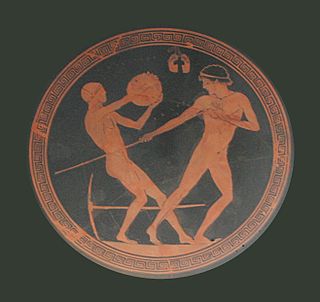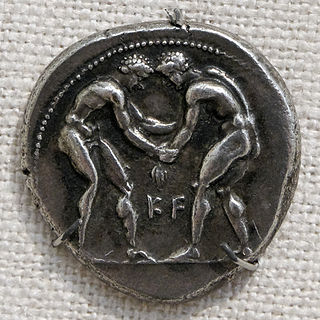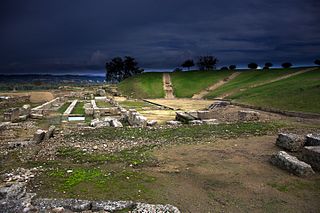Related Research Articles

Elis or Eleia is an ancient district in Greece that corresponds to the modern regional unit of Elis.

A pentathlon is a contest featuring five events. The name is derived from Greek: combining the words pente (five) and -athlon (competition). The first pentathlon was documented in Ancient Greece and was part of the Ancient Olympic Games. Five events were contested over one day for the Ancient Olympic pentathlon, starting with the long jump, javelin throwing, and discus throwing, followed by the stadion and wrestling. Pentathletes were considered to be among the most skilled athletes, and their training was often part of military service—each of the five events in the pentathlon was thought to be useful in war or battle.

Stadion or stade was an ancient running event, part of the Ancient Olympic Games and the other Panhellenic Games. It was one of the five major Pentathlon events. It was the premier event of the gymnikos agon.

Olympia is a small town in Elis on the Peloponnese peninsula in Greece, famous for the nearby archaeological site of the same name, which was a major Panhellenic religious sanctuary of ancient Greece, where the ancient Olympic Games were held. The Olympic Games were held every four years throughout Classical antiquity, from the 8th century BC to the 4th century AD. They were restored on a global basis in 1894 in honor of the ideal of peaceful international contention for excellence.

Elis or Ilia is one of the regional units of Greece. It is part of the region of Western Greece. It is situated in the western part of the Peloponnese peninsula. Its capital is Pyrgos.

A team sport includes any sport where individuals are organized into opposing teams which compete to win. Team members act together towards a shared objective. This can be done in a number of ways such as outscoring the opposing team. Team members set goals, make decisions, communicate, manage conflict, and solve problems in a supportive, trusting atmosphere in order to accomplish their objectives. Examples are basketball, volleyball, rugby, water polo, handball, lacrosse, cricket, baseball, and the various forms of association football and hockey.
The Hellanodikai were the judges of the Ancient Olympic Games, and the success of the games are attributed to their efforts. It was their sacred duty to maintain the standards and legacy of the games, as well as uphold the rules.
Troilus of Elis was an ancient Greek athlete from Elis who participated at the ancient Olympic Games. He gained controversy by being a referee who won two equestrian events at the 372 BC games. After that a law banned referees from competing. His story has at times been used to show the ancient games had a "win at any cost" mindset quite different from the modern Olympic ideal.

Greek wrestling, also known as Ancient Greek wrestling and Palé, was the most popular organized sport in Ancient Greece. A point was scored when one player touched the ground with his back, hip or shoulder, or conceding defeat due to a submission-hold or was forced out of the wrestling-area. Three points had to be scored to win the match.

The Heraea was an ancient Greek festival in which young girls competed in a footrace. The race was held every four years at Olympia, and probably took place around the same time as the ancient Olympic games.

The Temple of Hera, or Heraion, is an ancient Archaic Greek temple at Olympia, Greece, that was dedicated to Hera, queen of the Greek Gods. It was the oldest temple at Olympia and one of the most venerable in all Greece. It was originally a joint temple of Hera and Zeus, chief of the gods, until a separate temple was built for him. It is at the altar of this temple, which is oriented east-west, that the Olympic flame is lit and carried to all parts of the world. The torch of the Olympic flame is lit in its ruins to this day. The temple was built in approximately 590 BC, but was destroyed by an earthquake in the early 4th century CE.

Coroebus of Elis, commonly spelled Koroibos, was a Greek cook, baker and athlete from Elis, who won the stadion race in the first recorded Ancient Olympic Games in 776 BC.
Desmon of Corinth was an ancient Greek athlete from Corinth, who won the stadion race of the 14th Ancient Olympic Games in 724 BC. These were the first Olympic Games that also saw a double race, i.e. a race with a distance of 2 stadia, called Diaulos (δίαυλος); this double race was won by Hypenus of Elis.
Diaulos was a double-stadion race, c. 400 metres , introduced in the 14th Olympiad of the ancient Olympic Games.

The ancient Olympic Games were a series of athletic competitions among representatives of city-states and one of the Panhellenic Games of Ancient Greece. They were held in honor of Zeus, and the Greeks gave them a mythological origin. The first Olympic Games are traditionally dated to 776 BC. The games were held every four years, or Olympiad, which became a unit of time in historical chronologies. They continued to be celebrated when Greece came under Roman rule, 2nd century BC. Their last recorded celebration was in AD 393, under the emperor Theodosius I, but archeological evidence indicates that some games were still held after this date. The games likely came to an end under Theodosius II, possibly in connection with a fire that burned down the temple of the Olympian Zeus during his reign.
Hysmon was an Ancient Greek pentathlete from Elis.

Just how far back in history organized contests were held remains a matter of debate, but it is reasonably certain that they occurred in Greece almost 3,000 years ago. However ancient in origin, by the end of the 6th century BC at least four Greek sporting festivals, sometimes called "classical games," had achieved major importance: the Olympic Games, held at Olympia; the Pythian Games at Delphi; the Nemean Games at Nemea; and the Isthmian Games, held near Corinth. The Olympic Games were perhaps the greatest of these sporting events, and all Olympian victors were highly appreciated among the Greeks.

Elis was a polis (city-state) and the capital city of the ancient district of Elis, in ancient Greece. It was situated in the northwest of the Peloponnese, to the west of Arcadia. The position of the city of Elis was the best that could have been chosen for the capital of the country. Just before the Peneius emerges from the hills into the plain, the valley of the river is contracted on the south by a projecting hill of a peaked form, and nearly 500 feet (150 m) in height. This hill was the acropolis of Elis, and commanded as well the narrow valley of the Peneius as the open plain beyond. The ancient city lay at the foot of the hill, and extended across the river, as Strabo says that the Peneius flowed through the city; but since no remains are now found on the right or northern bank, it is probable that all the public buildings were on the left bank of the river, more especially as Pausanias does not make any allusion to the river in his description of the city.
